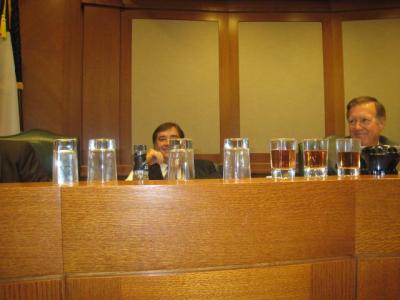
Rep. Lon Burnam’s bill, HB 3423, will be heard on Wednesday, April 1st, in the House Committee on Environmental Regulation hearing at 10:30 AM or upon adjournment, in E1.014. If you are able to come, we’re trying to get as many people as possible to register their support of this bill (by filling out a witness affirmation form). That’s right, officially registering your opinion on a bill is as simple as filling out a card. The bill closes the Compact Loophole, and requires other states who want to send radioactive waste here to get legislative approval first.
The Compact Agreement was originally between Texas, Maine and Vermont. Maine pulled out of the Compact, and now Texas and Vermont are able to send their radioactive so-called “low-level” waste to be stored at the Andrews County dump in West Texas. A loophole in the Compact Agreement allows any state to send radioactive waste to Texas. We don’t need to be the nation’s nuclear dump!
The license for that dump was recently issued by the TCEQ, and the agency wrongly denied the opportunity for a contested case hearing (read: locals were not allowed to voice their opposition in any formal environment). Three long-term scientists at TCEQ recommended denying the permit — and actually left their jobs for ethical reasons once the permit was approved. The science is NOT solid for the Andrews County radioactive waste dump – and there are concerns that radionuclides could come in contact with underground water. It is possible that contamination could spread to the Ogallala Aquifer, which underlies eight states, including the nation’s wheat growing region.
96% of the radioactive waste slated for the site would be from nuclear reactors — everything except the fuel rods. Radionuclides in the waste are dangerous today and remain dangerous for thousands of years. A recent Nuclear Regulatory Commission ruling reclassified depleted uranium from reprocessing, putting it into a less hazardous (Class A) category. Now up to 1.4 million tons of depleted uranium could go to the West Texas site and/or Clive, Utah sites.
If you can’t make it in person, calls to the Environmental Regulation committee in support of Burnam’s bill are needed! If you are a constituent, please let them know that.
Rep. Byron Cook (Chair) – 512-463-0646, Byron.Cook@house.state.tx.us
Rep. Warren Chisum (Vice-Chair) – 512-463-0736, Warren.Chisum@house.state.tx.us
Rep. Lon Burnam – 512-463-0740, (it’s his bill, give him a call to say thanks.)
Rep. Jim Dunnam – 512-463-0508, Jim.Dunnam@house.state.tx.us
Rep. Jessica Farrar – 512-463-0620, Jessica.Farrar@house.state.tx.us
Rep. Kelly Hancock – 512-463-0599, Kelly.Hancock@house.state.tx.us
Rep. Ken Legler – 512-463-0460, Ken.Legler@house.state.tx.us
Rep Marc Veasey – 512-463-0716, Marc.Veasey@house.state.tx.us
Rep. Randy Weber – 512-463-0707, Randy.Weber@house.state.tx.us
For further background on the Andrews County dump, check out Forrest Wilder’s article from the last Texas Observer, Waste Texas: Why Andrews County is so eager to get dumped on. Or if you’re more the auditory type, listen to the podcast.
Check out the press release after the jump.



